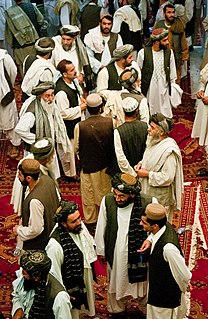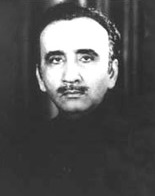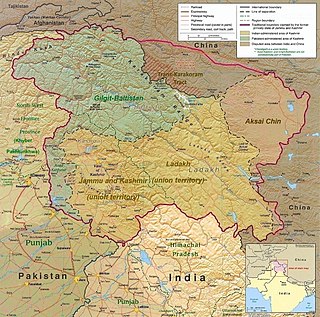Related Research Articles

Osama bin Mohammed bin Awad bin Laden, also transliterated as Usama bin Ladin, was a founder of the pan-Islamic militant organization al-Qaeda. The group is designated as a terrorist group by the United Nations Security Council, the North Atlantic Treaty Organization (NATO), the European Union, and various countries.

Pakistan, officially the Islamic Republic of Pakistan, is a country in South Asia. It is the world's fifth-most populous country, with a population exceeding 225.2 million, and has the world's second-largest Muslim population. Pakistan is the 33rd-largest country by area, spanning 881,913 square kilometres. It has a 1,046-kilometre (650-mile) coastline along the Arabian Sea and Gulf of Oman in the south, and is bordered by India to the east, Afghanistan to the west, Iran to the southwest, and China to the northeast. It is separated narrowly from Tajikistan by Afghanistan's Wakhan Corridor in the north, and also shares a maritime border with Oman.

The Taliban, which refers to itself as the Islamic Emirate of Afghanistan (IEA), is a Deobandi Islamist religious-political movement and military organization in Afghanistan. Currently one of two entities claiming to be the legitimate government of Afghanistan, alongside the internationally recognized Islamic Republic of Afghanistan, the Taliban maintain de facto control the country. The Taliban's ideology has been described as combining an "innovative" form of Sharia Islamic law based on Deobandi fundamentalism and militant Islamism, combined with Pashtun social and cultural norms known as Pashtunwali, as most Taliban are Pashtun tribesmen. The group is internally funded by its activities in the illegal drug trade by producing and trafficking narcotics such as heroin, extortion, and kidnap and ransom. They also seized control of mining operations in the mid 2010s which were illegal under the previous government.

Pashtuns, historically known as Afghans, are an Iranian ethnic group native to Central and South Asia. The ethnic group's native language is Pashto, an Eastern Iranian language. Additionally, ethnic Pashtuns in Afghanistan speak the Dari dialect of Persian as a second language, while those in the Indian subcontinent use Hindi-Urdu as a second language. However, a significant minority speaks Persian or Hindi-Urdu as their first language. The total number of Pashtuns is estimated to be around 63 million; however, this figure is disputed, because of the lack of an official census in Afghanistan since 1979.

The Pakistan Air Force (PAF) is the aerial warfare branch of the Pakistan Armed Forces, tasked primarily with the aerial defence of Pakistan, with a secondary role of providing air support to the Pakistan Army and Navy when required, and a tertiary role of providing strategic airlift capability to Pakistan. As of 2021, as per the International Institute for Strategic Studies, the PAF has 70,000 active-duty personnel and operates at least 594 aircraft. Its primary mandate and mission is "to provide, in synergy with other inter-services, the most efficient, assured and cost effective aerial defence of Pakistan." Since its establishment in 1947, the PAF has been involved in various combat operations, providing aerial support to the operations and relief efforts of the Pakistani military. Under Article 243, the Constitution of Pakistan appoints the President of Pakistan as the civilian Commander-in-Chief of the Pakistan Armed Forces. The Chief of Air Staff (CAS), by statute a four-star commissioned air officer, is appointed by the President with the consultation and confirmation needed from the Prime Minister of Pakistan.

The Indo-Pakistani War of 1971 was a military confrontation between India and Pakistan that occurred during the Bangladesh Liberation War in East Pakistan from 3 December 1971 to the fall of Dacca (Dhaka) on 16 December 1971. The war began with Operation Chengiz Khan's preemptive aerial strikes on 11 Indian air stations, which led to the commencement of hostilities with Pakistan and Indian entry into the war for independence in East Pakistan on the side of Bengali nationalist forces. Lasting just 13 days, it is one of the shortest wars in history. In the process, it also become part of the nine-month long Bangladesh Liberation War.

The Indo-Pakistani War of 1947–1948 or the First Kashmir War was an armed conflict that was fought between India and Pakistan over the princely state of Jammu and Kashmir from 1947 to 1948. It was the first of four Indo-Pakistani wars that was fought between the two newly-independent nations. Pakistan precipitated the war a few weeks after its independence by launching tribal lashkar (militias) from Waziristan, in an effort to capture Kashmir and to preempt the possibility of its ruler joining India. The inconclusive result of the war still affects the geopolitics of both countries.

The Indo-Pakistani War of 1965 was a culmination of skirmishes that took place between April 1965 and September 1965 between Pakistan and India. The conflict began following Pakistan's Operation Gibraltar, which was designed to infiltrate forces into Jammu and Kashmir to precipitate an insurgency against Indian rule. India retaliated by launching a full-scale military attack on West Pakistan. The seventeen-day war caused thousands of casualties on both sides and witnessed the largest engagement of armored vehicles and the largest tank battle since World War II. Hostilities between the two countries ended after a ceasefire was declared through UNSC Resolution 211 following a diplomatic intervention by the Soviet Union and the United States, and the subsequent issuance of the Tashkent Declaration. Much of the war was fought by the countries' land forces in Kashmir and along the border between India and Pakistan. This war saw the largest amassing of troops in Kashmir since the Partition of India in 1947, a number that was overshadowed only during the 2001–2002 military standoff between India and Pakistan. Most of the battles were fought by opposing infantry and armoured units, with substantial backing from air forces, and naval operations.

The Bangladesh Liberation War, also known as the Bangladesh War of Independence, or simply the Liberation War in Bangladesh, was a revolution and armed conflict sparked by the rise of the Bengali nationalist and self-determination movement in what was then East Pakistan during the 1971 Bangladesh genocide. It resulted in the independence of the People's Republic of Bangladesh. The war began when the Pakistani military junta based in West Pakistan launched Operation Searchlight against the people of East Pakistan on the night of 25 March 1971. It pursued the systematic elimination of nationalist Bengali civilians, students, intelligentsia, religious minorities and armed personnel. The junta annulled the results of the 1970 elections and arrested Prime minister-designate Sheikh Mujibur Rahman. The war ended on 16 December 1971 when the military forces of West Pakistan that were in Bangladesh surrendered.

Mohammad Khan Junejo was a Pakistani politician and an agriculturist who served as the tenth prime minister of Pakistan, having elected in this capacity in 1985 until being dismissed in 1988.
Hindus have experienced both historical and ongoing religious persecution and systematic violence, in the form of forced conversions, documented massacres, demolition and desecration of temples, as well as the destruction of educational centres. While massive in scale, some of these events may need to be viewed in their historical context and relative impact.

The Kashmir conflict is a territorial conflict over the Kashmir region, primarily between India and Pakistan, with China playing a third-party role. The conflict started after the partition of India in 1947 as both India and Pakistan claimed the entirety of the former princely state of Jammu and Kashmir. It is a dispute over the region that escalated into three wars between India and Pakistan and several other armed skirmishes. India controls approximately 55% of the land area of the region that includes Jammu, the Kashmir Valley, most of Ladakh, the Siachen Glacier, and 70% of its population; Pakistan controls approximately 35% of the land area that includes Azad Kashmir and Gilgit-Baltistan; and China controls the remaining 20% of the land area that includes the Aksai Chin region, the mostly uninhabited Trans-Karakoram Tract, and part of the Demchok sector. After the partition of India and a rebellion in the western districts of the state, Pakistani tribal militias invaded Kashmir, leading the Hindu ruler of Jammu and Kashmir to join India. The resulting Indo-Pakistani War ended with a UN-mediated ceasefire along a line that was eventually named the Line of Control. After further fighting in the wars of 1965 and 1971, the Simla Agreement formally established the Line of Control between the two nations' controlled territories. In 1999, an armed conflict between India and Pakistan broke out again in Kargil with no effect on the status quo.

Kashmiris are a Dardic ethno-linguistic group and first-language speakers of the Kashmiri, living mostly, but not exclusively, in the Kashmir Valley in the portion of the disputed Kashmir region administered by India.

This is a timeline of Pakistani history, comprising important legal and territorial changes and political events in today's Pakistan and its predecessor states. To read about the background of these events, see History of Pakistan and History of the Islamic Republic of Pakistan. See also the list of Presidents of Pakistan, the list of Prime Ministers of Pakistan and the list of years in Pakistan.
The United Nations has played an important role in maintaining peace and order in the Kashmir region soon after the independence of India and Pakistan in 1947, when a dispute erupted between the two States on the question of Jammu and Kashmir. India took this matter to the UN Security Council, which passed resolution 39 (1948) and established the United Nations Commission for India and Pakistan (UNCIP) to investigate the issues and mediate between the two countries. Following the cease-fire of hostilities, it also established the United Nations Military Observer Group in India and Pakistan (UNMOGIP) to monitor the cease-fire line.

Jammu and Kashmir, officially known as the Princely State of Kashmir and Jammu, was a princely state during the British East India Company rule as well as the British Raj in India from 1846 to 1952. The princely state was created after the First Anglo-Sikh War, from the territories that had earlier been in Sikh Empire.

South Asia is the southern region of Asia, which is defined in both geographical and ethno-cultural terms. The region consists of the countries of Afghanistan, Bangladesh, Bhutan, India, Nepal, Pakistan, Sri Lanka and the Maldives. Topographically, it is dominated by the Indian Plate and defined largely by the Indian Ocean on the south, and the Himalayas, Karakoram, and Pamir mountains on the north. The Amu Darya, which rises north of the Hindu Kush, forms part of the northwestern border. On land (clockwise), South Asia is bounded by Western Asia, Central Asia, East Asia, and Southeast Asia.
Barbara Nelle Ramusack is a historian and Charles Phelps Taft Professor of History Emerita at the University of Cincinnati. Her focus was on Indian and Chinese History. She obtained her Ph.D in 1969 from the University of Michigan.

Muhammad Ali Jinnah was a barrister, politician and the founder of Pakistan. Jinnah served as the leader of the All-India Muslim League from 1913 until the inception of Pakistan on 14 August 1947, and then as the Dominion of Pakistan's first governor-general until his death. He is revered in Pakistan as the Quaid-i-Azam and Baba-i-Qaum. His birthday is observed as a national holiday in Pakistan.